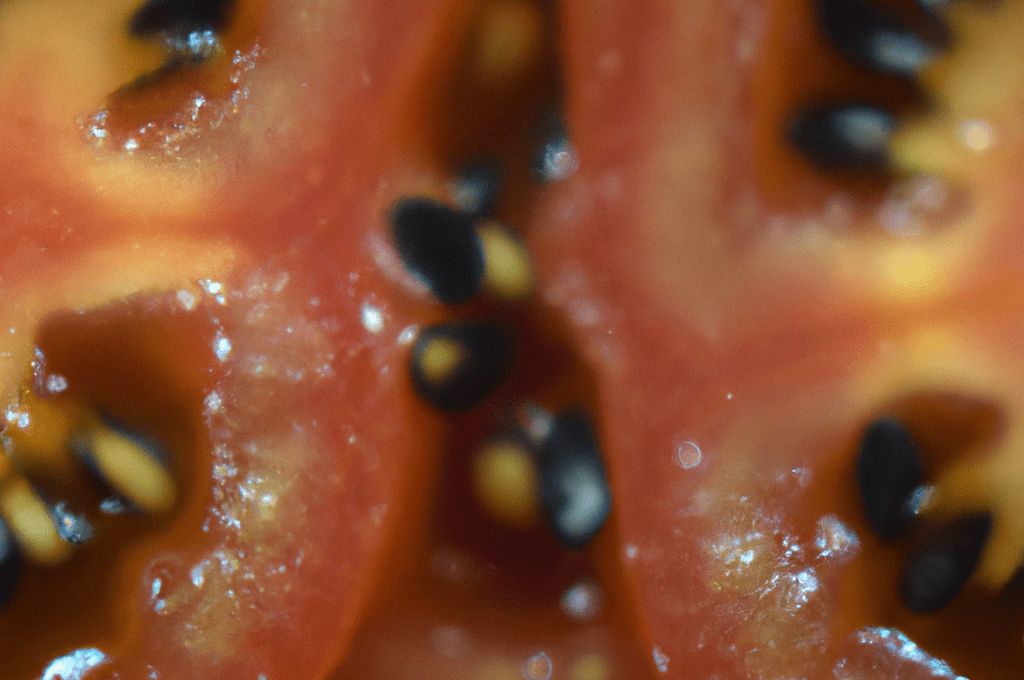Do you ever cut open a tomato, only to find black seeds or spots inside? It can be alarming to see, but before you throw the tomato away, it’s important to understand whether these discolorations are harmless or hazardous to your health.
In this article, we’ll explore the causes of black seeds and spots in tomatoes and the potential dangers, if any, of consuming them.
Tomatoes are a popular ingredient in many dishes, from salads to sauces to sandwiches. They are known for their bright red color and juicy texture, but the appearance of black seeds or spots can be a cause for concern.
You may wonder if they are a sign of spoilage or contamination, and whether eating them could make you sick. By understanding what causes these discolorations and what risks they may pose, you can make an informed decision about whether to eat or discard the tomato in question.
So, let’s dive into the world of black seeds in tomatoes and learn more about their safety.
Quick Summary
- Black seeds/spots in tomatoes are generally harmless and a natural part of the ripening process.
- Causes of black seeds/spots include overripe tomatoes and vivipary.
- Tomatoes with black seeds/spots are safe to consume if there are no signs of disease, mold, or pest infestation.
- Tomato seeds have no taste and are safe to eat, and tomatoes are a great source of nutrition.
Causes of Black Seeds/Spots
So, you’re probably wondering what causes those black seeds or spots in your tomatoes. Well, it could be due to a few different factors.
One reason may be overripe tomatoes, which can lead to the seeds turning black. Another cause could be vivipary, which is when a tomato starts to sprout inside the fruit. This can cause black spots or seeds to appear.
It’s important to note that these causes aren’t necessarily dangerous to your health. In fact, as our previous knowledge mentioned, tomatoes with black seeds or spots are generally safe to consume as long as there aren’t any signs of disease, mold, or pest infestation.
So, don’t be too worried if you see a few black seeds in your tomato – it’s just a natural part of the ripening process.
Safety of Consumption
If you see any signs of disease, mold, or pest infestation, it’s best to avoid consuming tomatoes with black seeds or spots. However, if there are only one or two black spots, you can simply slice them away and consume the rest safely. Some people may also choose to remove black seeds before consumption, although tomato seeds have no taste and are generally safe to eat.
Despite the presence of black seeds or spots, tomatoes are still a great source of nutrition. They are low in calories but high in vitamins and minerals such as vitamin C, potassium, and lycopene. You can also cook with black seeded tomatoes in a variety of dishes, such as soups, salads, and sauces. So don’t let the appearance of black seeds or spots scare you away from enjoying the nutritional benefits and delicious taste of tomatoes.
Key Points and Additional Information
You may be surprised to know that tomato seeds actually have no discernible taste, but they’re packed with nutrients like vitamins and minerals.
So, if you find black seeds in your tomatoes, don’t worry about their taste. Instead, focus on the ripening process of your tomatoes, which takes around 2-4 weeks after they’re harvested.
During this process, tomatoes may develop black spots or seeds due to various reasons like bacterial canker or anthracnose. But, if you find only one or two black spots, you can easily slice them away and consume the rest safely.
In fact, consuming tomatoes with black seeds or spots is generally safe as long as there are no signs of disease, mold, or pest infestation. So, don’t miss out on the benefits of tomatoes just because of a few black seeds or spots.
Frequently Asked Questions
Are black seeds in tomatoes a sign of genetic modification or contamination?
No, black seeds in tomatoes are not a sign of genetic modification or contamination. Tomato seed color is determined by plant breeding and has no impact on safety. Enjoy your tomatoes worry-free!
Can black seeds or spots in tomatoes cause any allergic reactions or health issues?
You don’t have to worry about tomato allergies from black seeds or spots. They’re generally safe to eat, and you can always remove the seeds if you prefer. Seedless varieties are also available.
Can cooking or processing tomatoes with black seeds or spots affect their safety for consumption?
Cooking techniques like roasting or stewing can kill harmful bacteria in tomatoes with black seeds or spots. Seed removal is optional but recommended for better texture. Always ensure tomatoes are fresh and free of signs of disease or mold before cooking or consuming.
Are there any nutritional differences between tomatoes with black seeds or spots and those without?
Seedless tomato varieties are not nutritionally different from those with black seeds or spots. However, black seeds have potential benefits as they contain antioxidants and healthy fats. Don’t fear the black seeds, embrace them.
Are there any specific varieties of tomatoes that are more prone to developing black seeds or spots?
Some tomato varieties are more prone to seed development and black spots. This is due to genetic factors and the growing conditions. Check with your local nursery for information on varieties that are less prone to these issues.









